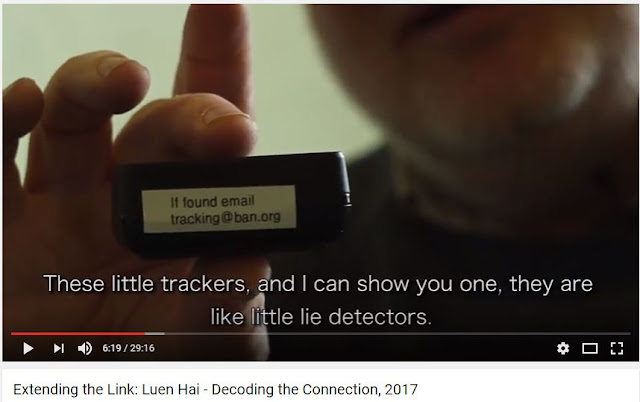Wow, haven't followed up that much since the MIT SenseAble City Lab and BAN GPS tracking project was pulled to MIT legal office about a year ago. Readers are aware that this blog tracked many of the devices into places that BAN didn't want to talk about - like a University reuse operation in Faisalabad, or modern 21st century EcoPark in Hong Kong (no longer obscured in Monitour).
Well I just ran across a little video produced in 2017 by Luen Hai - Decoding the Connection. In it, at about minute 6, a Hong Kong reporter identifies Jim Puckett of Basel Action Network as an important expert in e-waste imports to Hong Kong. Then Jim says on screen that 54% of the GPS trackers the organization placed in e-waste was shipped to Hong Kong.
If you know about this study, you may think I made a typo. The numbers are so specifically wrong. But this is Jim's recorded voice, in his own words... screenshots with subtitles below.
1. "These little trackers, and I can show you one, they are like little lie detectors"
IRONY of IRONIES... Listen to what Jim tells the filmmaker about the GPS "lie detector"... Full video at bottom below.
Well I just ran across a little video produced in 2017 by Luen Hai - Decoding the Connection. In it, at about minute 6, a Hong Kong reporter identifies Jim Puckett of Basel Action Network as an important expert in e-waste imports to Hong Kong. Then Jim says on screen that 54% of the GPS trackers the organization placed in e-waste was shipped to Hong Kong.
If you know about this study, you may think I made a typo. The numbers are so specifically wrong. But this is Jim's recorded voice, in his own words... screenshots with subtitles below.
1. "These little trackers, and I can show you one, they are like little lie detectors"
IRONY of IRONIES... Listen to what Jim tells the filmmaker about the GPS "lie detector"... Full video at bottom below.








